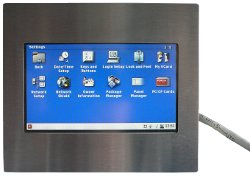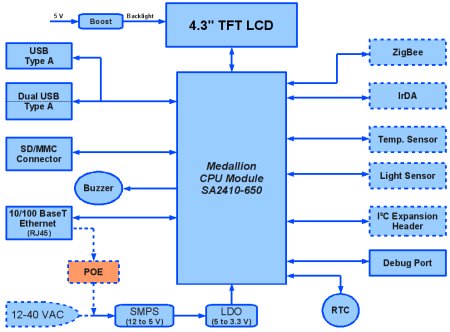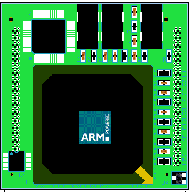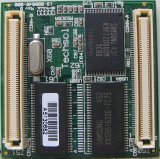Techsol touch panel ships, marking 10 years of embedded ARM devices
Oct 9, 2009 — by Eric Brown — from the LinuxDevices Archive — 5 viewsTechsol is shipping a Linux-ready “TPC-43B” 4.3-inch touch-panel PC equipped with its ARM-based Medallion CPU Module and Power-over-Ethernet support, and targeting building automation and factory HMI applications. Meanwhile, Techsol announced its tenth year of designing low-power computers based on a variety of low-power ARM-based embedded computers.
Techsol is a British Columbia-based embedded board and development services vendor that offers extensive in-house customization features, as well as Linux development tools for its Medallion touch panels. The company has been around for 14 years now, and for a decade now, it has been developing various, highly customizable, production-ready embedded modules, boards, and devices based on its ARM9-based Medallion module (see farther below for more on Techsol's first decade of ARM products.)

Techsol TPC-43B
The Medallion module incorporates Samsung's ARM-920T-powered S3C2410 system-on-chip. The SoC also offers an MMU (memory management unit) and 16KB each of instruction and data cache.
The TPC-43B ships with 64MB SDRAM and 128MB NAND flash, as well as a separate allotment of NOR flash for boot-loader and firmware updates. The system also offers a hidden memory card slot for SD and MMC cards, says the company.

Techsol TPC-43B block diagram
(Click to enlarge)
The fanless, 5.1 x 4.4 x 1.1-inch system draws less than 200 mA running at the full 200MHz speed with 12 volts in, says Techsol. This enables the system to support Power-over-Ethernet (PoE), which the company says is especially useful in reducing electrical installation costs.
"The cost-savings from using POE are substantial, particularly in industrial environments and metal buildings," said Brian Empey, P.Eng., CEO of Techsol, in a statement. "Compared to getting the electrical contractor out to run power and communications lines to the location of each HMI unit, with POE you just run a single CAT 5 cable and you're done. And since it's 'low-voltage' per the NEC, you usually don't need a certified electrician. In fact, your IT person can normally take care of this for you, often saving hundreds of dollars per unit installed."
Specifications listed for the TPC-35B include:
- Processor — Techsol Medallion SA2410-650 module with Samsung s3c2410a SoC (ARM-920T core); MMU; 16KB instruction and 16K data cache
- Memory — 64MB SDRAM
- Flash — 128MB NAND flash
- Flash expansion — SD/MMC card slot (hidden)
- Display — 4.3-inch WqVGA (480 x 272) color TFT LCD touchscreen (landscape); adjustable LED backlight
- Networking — 1 x 10/100 Ethernet ports (RJ45)
- USB — 1 x full-speed, USB Host port (Type A)
- Serial — 1 x serial port (via optional DE9 adapter)
- Other features:
- Real-Time Clock (RTC) with battery backup
- Beeper for alerts
- Mountable on 1-gang or 2-gang electrical box
- Power — 10-30 VDC or 7-24 VAC; or PoE
- Power consumption — Typically, with 12V in, consumes < 200 mA @ 200MHz (full speed)
- Dimensions — 5.1 x 4.4 x 1.1 inches (129 x 111 x 28mm)
- Operating system — Medallion Linux 2.6
The TPC-35B comes preinstalled with Medallion Linux, which includes a "proven" Linux 2.6 kernel and drivers, the company said. Embedded GUI stacks listed as either available or included are:
- Linux framebuffer (FB) driver, operating in 16-bit, 65,536-color mode
- X11 (KDrive) on FB, for "standard Linux/Unix graphics"
- FLTK on X, for a "full-featured, extensible, yet free GUI"
- GTK+ on X, for "full PC compatibility"
Techsol celebrates 10 years of embedded ARM products
Headquartered in Delta, British Columbia, Canada, or more specifically, as the company puts it "where the mighty Fraser River meets the Pacific Ocean," 14-year-old Techsol has been a mainstay of the embedded ARM business since 1999. The company began with a commercial, hard-drive-based MP3 player design that the company boasts came out two years before the first iPod.
 |
The long and expensive development of the player inspired Techsol to develop its Medallion CPU module (the original design is pictured at right). The aim was to reduce development time, cost, and risk, both for itself and its customers. Back in 2002, says Techsol, creating a 50mm square computer with a 32-bit expansion bus, full video, audio, and USB was "pretty radical."
Gambling on ARM — and Linux
With the MP3 player, Techsol ran Kadak's AMX RTOS (real-time operating system), which despite being fast, had limited software options especially for GUIs, stated Techsol CEO Brian Empey. The Techsol team decided that the embedded hardware industry would moving toward ARM-based systems running Linux, so the company decided to make the jump itself with the Medallion.
"Packaging a Linux-powered ARM computer into a small form-factor looked like a great way to help other product developers leap-frog the huge learning-curves associated with both technologies," stated Empey. "Plus, we continue to design products for customers, but now they're all Medallion-powered, which dramatically reduces development time."
Development of the 1st Medallion CPU module started in 2000, and the final product shipped in 2002. Techsol first started with an ARM 720T-based Hynix (Hyundai) chip, with both LCD and VGA controllers on board. The chip worked well for wearable computers, which was one of Techsol's interests, but it was admittedly obscure.
"Creating a Linux BSP for an unsupported processor, including boot loaders, is an onerous task," stated Empey. "But we worked from datasheets up with the CL7312, so we already had experience with MMUs and ARM's processor architecture, which eased development — not that we'd ever want to do that again."
 |
In 2006, the company moved to the ARM9-based Samsung SA2410, which ran Linux 2.6.x, and the choice has lasted them almost four years so far. (The initial 2006 Medallion variant is pictured at left.)
Techsol's customers appear to like the fact that the company doesn't jump from one sexy new chip to another or continually churn out radically different module designs. Its loyalty to the SA2410 is one way in which Techsol "focuses on planned non-obsolescence," by developing products that plug into customers' old designs, said Empey.
"Our strict backwards compatibility is what really saves our customers money — that and our deep Linux experience and dedication to supporting the HW with piles of SW," stated Empey. "Our customers typically don't even have Linux driver-capable developers on staff — they just concentrate on applications. We take care of the low-level details for them. We even pre-load the customer's image onto the products after testing every one running the latest Linux distribution."
Techsol claims to have shipped "many tens of thousands" of Medallion modules and Medallion-based systems. Design wins are said to include automotive systems, FDA-approved medical devices, and a mix of commercial, defense, and industrial customers. Although it will continue to offer Medallion designs based on the Samsung SA2410, future plans call for designs based on an OMAP (Texas Instruments) SoC, as well as "newer ARM-926" processors, says the company.
Availability
Pricing for the TPC-43B is listed as $439 for 10 units or less, $399 for 100, $369 for 1,000, says Techsol. More information may be found here.
This article was originally published on LinuxDevices.com and has been donated to the open source community by QuinStreet Inc. Please visit LinuxToday.com for up-to-date news and articles about Linux and open source.